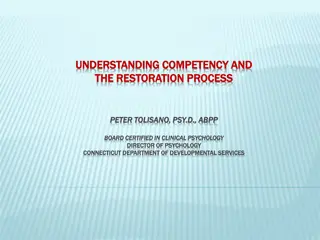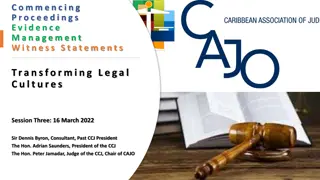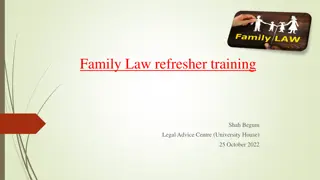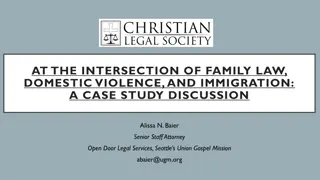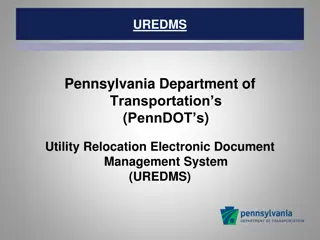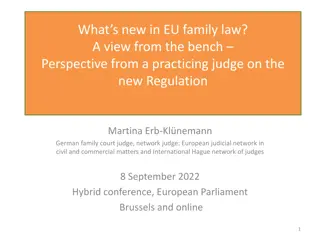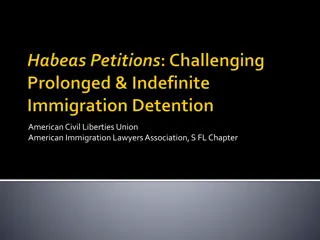Legal Requirements for Relocation in Family Law Proceedings
Understanding the legal aspects of relocation in family law is crucial for parents seeking to move with their child. From defining what constitutes a relocation to outlining the necessary components of a relocation agreement and petition, this information provides insight into the procedures involved and consequences of non-compliance. Failure to follow these legal requirements can result in serious implications for the relocating parent.
Download Presentation

Please find below an Image/Link to download the presentation.
The content on the website is provided AS IS for your information and personal use only. It may not be sold, licensed, or shared on other websites without obtaining consent from the author.If you encounter any issues during the download, it is possible that the publisher has removed the file from their server.
You are allowed to download the files provided on this website for personal or commercial use, subject to the condition that they are used lawfully. All files are the property of their respective owners.
The content on the website is provided AS IS for your information and personal use only. It may not be sold, licensed, or shared on other websites without obtaining consent from the author.
E N D
Presentation Transcript
RELOCATIONS 61.13001 FAMILY FUNDAMENTALS JUDGE POLK
WHAT IS A RELOCATION A change in the location of the principal residence of a parent or other person from his or her principal place of residence at the time of the last order establishing or modifying time sharing, or at the time of filing the pending action to establish or modify time sharing. The change of location must be at least 60 consecutive days not including a temporary absence from the principal residence for purposes of vacation, education, or the provision of health care for the child.
REQUIREMENTS OF AN AGREEMENT Must be in writing Reflects consent to relocation Defines access or timesharing schedule for the non-relocating parent Describes any transportation arrangements related to access or timesharing. IF THERE IS A PRIOR JUDGMENT: the parties SHALL seek ratification of the agreement without the necessity of an evidentiary hearing UNLESS it is requested by one of the Parties, in writing, within 10 days after the date of the agreement is filed with the Court. If a hearing is not timely requested, it shall be presumed that the relocation is in the best interests of the child and the Court may ratify the agreement without an evidentiary hearing.
WHAT HAS TO BE IN THE PETITION? Pleadings must be served AND contain the following: A description of the location of the intended new residence, including the state, city, and specific physical address, if known. The mailing address The home number The date of the intended move A detailed statement of the specific reasons for the proposed relocation. If one of the reasons is based upon a job offer that has been reduced to writing, the written job offer must be attached to the Petition.
REQUIREMENTS OF THE PETITION CONTINUED A proposal for the revised post relocation schedule for access and timesharing together with arrangement for transportation necessary. ABSENT THE EXISTENCE OF A CURRENT, VALID ORDER ABATING, TERMINATING, OR RESTRICTING ACCESS OR TIMESHARING OR OTHER GOOD CAUSE PREDATING THE PETITION, FAILURE TO COMPLY WITH THIS PROVISION RENDERS THE PETITION TO RELOCATION LEGALLY INSUFFICIENT. Substantially the following statement in all capital letters and in the same size type, or larger, as the type in the remainder of the petition: A RESPONSE TO THE PETITION OBJECTING TO RELOCATION MUST BE MADE IN WRITING, FILED WITH THE COURT, AND SERVED ON THE PARENT OR OTHER PERSON SEEKING TO RELOCATE WITHIN 20 DAYS AFTER SERVICE OF THIS PETITION TO RELOCATE. IF YOU FAIL TO TIMELY OBJECT TO THE RELOCATION, THE RELOCATION WILL BE ALLOWED, UNLESS IT IS NOT IN THE BEST INTERESTS OF THE CHILD, WITHOUT FURTHER NOTICE AND WITHOUT A HEARING.
WHAT HAPPENS IF A PARENTS RELOCATES WITHOUT COMPLYING? That party is subjected to contempt and other proceedings to compel the return of the child and may be taken into account by the Court in any initial or post-judgment proceedings as: A factor in making a determination regarding the relocation of a child. A factor in determining whether the parenting plan or the access or timesharing schedule should be modified. A basis for ordering the temporary or permanent return of the child. Attorney fees or expenses incurred by the party objecting to the relocation.
OBJECTION TO RELOCATION An answer must be verified and include specific factual basis supporting reasons for seeking a prohibition of the relocation, including a statement of the amount of participation or involvement. DENIAL 1. If the Petition does not comply with subsection 3; 2. The child has been relocated without written agreement or court approval; 3. There is a likelihood that upon Final Hearing the Court will not approve the relocation. GRANT Petition was properly filed and is in compliance with Statute AND there is a likelihood that on final hearing the Court will approve the relocation of the child based on the factors. If the Temporary is granted you CANNOT give any weight to the temporary relocation as a factor in reaching a final decision.
FACTORS (a) The nature, quality, extent of involvement, and duration of the child s relationship with the parent or other person proposing to relocate with the child and with the non-relocating parent, other persons, siblings, half-siblings, and other significant persons in the child s life.
FACTORS CONTINUED (b) impact the relocation will have on the child s physical, educational, and emotional development, taking into consideration any special needs of the child. The age and developmental stage of the child, the needs of the child, and the likely
FACTORS CONTINUED (c) The feasibility of preserving the relationship between the non-relocating parent or other person and the child through substitute arrangements that take into consideration the logistics of contact, access, and time-sharing, as well as the financial circumstances of the parties; whether those factors are sufficient to foster a continuing meaningful relationship between the child and the non-relocating parent or other person; and the likelihood of compliance with the substitute arrangements by the relocating parent or other person once he or she is out of the jurisdiction of the court.
FACTORS CONTINUED (d) The child s preference, taking into consideration the age and maturity of the child.
FACTORS CONTINUED (e) Whether the relocation will enhance the general quality of life for both the parent or other person seeking the relocation and the child, including, but not limited to, financial or emotional benefits or educational opportunities.
FACTORS CONTINUED (f) The reasons each parent or other person is seeking or opposing the relocation.
FACTORS CONTINUED (g) The current employment and economic circumstances of each parent or other person and whether the proposed relocation is necessary to improve the economic circumstances of the parent or other person seeking relocation of the child.
FACTORS CONTINUED (h) has fulfilled his or her financial obligations to the parent or other person seeking relocation, including child support, spousal support, and marital property and marital debt obligations. That the relocation is sought in good faith and the extent to which the objecting parent
FACTORS CONTINUED (i) The career and other opportunities available to the objecting parent or other person if the relocation occurs.
FACTORS CONTINUED (j) A history of substance abuse or domestic violence as defined in s. 741.28 or which meets the criteria of s. 39.806(1)(d) by either parent, including a consideration of the severity of such conduct and the failure or success of any at attempts at rehabilitation.
FACTORS CONTINUED (k) Any other factor affecting the best interest of the child or as set forth in s. 61.13.
BURDEN OF PROOF The Parent requesting relocation has the burden of proving by preponderance of the evidence that relocation is in the best interest of the child. If that burden is met, the burden shifts to the non-relocating parent to shown by a preponderance of the evidence that the proposed relocation is not in the best interests of the child.
PRIORITY FOR HEARING OR TRIAL The temporary and permanent hearings shall be accorded priority on the Court s calendar. Temporary Relocation hearing absent good cause, the hearing must occur no later than 30 days after the Motion for temporary relocation is FILED. Permanent Hearing If a notice to set for nonjury trial is filed, absent good cause, the nonjury trial must occur no later than 90 days after the notice is filed.
THATS INTERESTING! Rolison v. Rolison, 144 So. 3d 610 (Fla. 1stDCA, 2014). Relocation statute does not apply when a parent moves PRIOR to the other parent s dissolution action being filed. Additionally, Section 61.13(2)(a) provides the Court with the authority to approve a parenting plan even if the child is not physically present in Florida at the time of filing, if it appears that the primary purpose of the child s removal was to avoid the Court s approval of a parenting plan. Brooks v. brooks, 164 So. 3d 162 (Fla. 2d DCA 2015). Even as a noncustodial parent was required to seek court permission before relocating. Tucker v. Liebknecht, 86 So. 3d 1240 (Fla. 5thDCA 2012). The appropriate method of calculating the distance for the 50-mile relocation restriction is a straight line radius method or as the crow flies .








